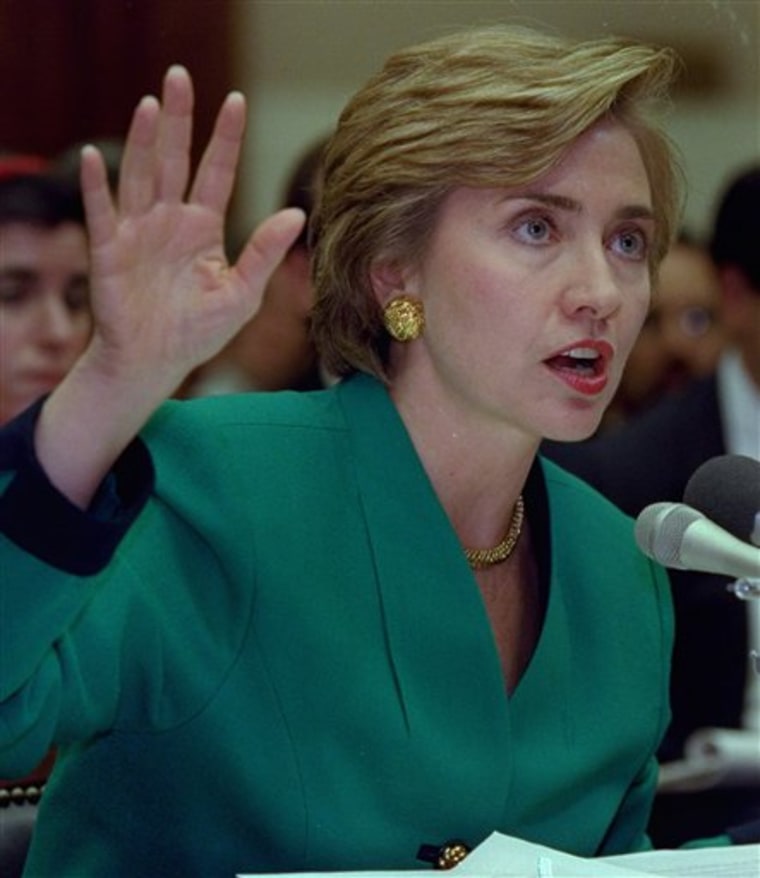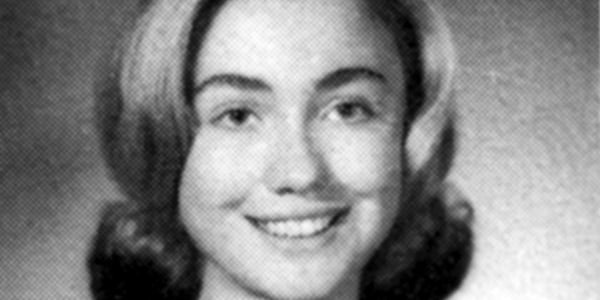The extraordinary life and adventures of Hillary Rodham Clinton began with an utterly ordinary childhood in the middle of the country, in the middle of the century, in the house at the corner of Wisner and Elm.
Hers was an Ozzie and Harriet youth of dodge ball, baby-sitting and bologna sandwiches in suburban Chicago. The girl scout grew into a Goldwater girl, the Goldwater girl became a Democrat, the Democrat became a lawyer, and the lawyer fell in love with a lawyer.
That is where the story line begins its improbable, serpentine path, wending from Watergate to Whitewater to the White House. Now, after a side trip to the Capitol, Clinton hopes it will take her back to the White House once again, this time as the first female president rather than the dutiful spouse.
Her future, says Clinton, has always been unpredictable.
"It's a constant surprise what I do and what happens to me," she said when she turned 50, in 1997.
Hillary Diane Rodham was the darling of Wellesley College, president of the college government during her senior year. In a commencement address, she addressed herself to fellow members of the all-girl class of 1969 who, she said, were "not in the positions yet of leadership and power."
Not yet, she said. But clearly she felt that the day would come for them, and for her.
She excelled at Yale Law School, too, one of 27 women in a class of 235 that included a young Arkansan named Bill Clinton.
Impeachment irony
Within months of graduation in 1973, both were invited to come to Washington to join the House Judiciary Committee's special impeachment inquiry staff as the Watergate scandal unfolded. Rodham jumped at the chance; her boyfriend, Clinton, opted to stay in Arkansas and make an ultimately unsuccessful run for Congress.
So at 26, Rodham helped to craft the presidential impeachment procedures that, in a twist of fate, would decades later be used against her husband. Then, abruptly, Richard M. Nixon resigned the presidency and she was out of a job.
This is when the Clinton factor kicked in. Rodham thought she might want to be a trial lawyer, but she felt the tug to join Clinton so she accepted a teaching position at the University of Arkansas.
Slideshow 53 photos
Hillary Clinton
"If we were to be together, one of us had to give ground," she wrote later.
They married in 1975. For the next quarter-century, Rodham was the one to give ground - even on her name.
A political spouse
Rodham kept her maiden name when they first married, seeing it as a small gesture to show "I was still me." She later bowed to local pressure and became Hillary Rodham Clinton.
The Arkansas years, with Bill Clinton serving first as state attorney general and later as governor, began Hillary's education on life as a political spouse. She practiced law, became a mother, worked as an advocate for women and children.
She had no premonition of how the Clintons' tangled relationships and business dealings in a small state where everyone seemed to know one another would mushroom into big trouble when they made the leap to national politics.
Even as the Clintons grew in stature and laid the groundwork for their national emergence, the troubles that would weigh them down and bring the likes of prosecutor Kenneth Starr into their lives also developed - the land deal known as Whitewater, Bill Clinton's adventures with other women, and questionable commodity trades by Hillary Clinton.
A 'zone of privacy'
In the summer of 1991, the Clintons and daughter Chelsea, then 11, vacationed in British Columbia and it was then, she said, that the decision was made for her husband to run for president. "I could not have predicted all that would happen, but I believed Bill was prepared," she wrote in her memoir. "We figured: What did we have to lose?"
Within months, Hillary Clinton was pleading for a "zone of privacy" in the mosh pit of the 1992 campaign.
Headlines splashed Gennifer Flowers' claims of a 12-year affair with Bill Clinton and other rumors of his womanizing.
Hillary Clinton planted herself on a couch next to her husband and defended her marriage during an appearance on CBS' "60 Minutes" meant to salvage his gasping campaign.
"I love him and I respect him and I honor what he's been through and what we've been through together. ... If that's not enough for people, then heck, don't vote for him," she said.
Conservatives vilified her as a radical feminist who felt disdain for the family unit. Her offhand remark that she chose to work when she could have "stayed home and baked cookies and had teas" only inflamed tensions.
Bill Clinton's declaration that a vote for him would get voters "two for the price of one" led critics to speculate that the couple planned a co-presidency - "Billary," they called it.
By summer, Hillary was in a chocolate chip cookie bake-off with Barbara Bush - and won.
Then came Whitewater
Even after the campaign was over and won, the "zone of privacy" proved to be nothing but a fantasy. It took Clinton time to become reconciled to that.
In the meantime, the Whitewater drumbeat continued. Questions about her commodity trades back in Arkansas persisted. Her every move - and haircut - was put under the microscope.
Put in charge of the monumental task of health care reform by her husband, Hillary Clinton set out to redefine the role of first lady. When the health care effort turned into a monumental failure, on bad days she would blame herself for coming on too strong and galvanizing her opponents.
It was late in 1994, at her famous hourlong news conference, when she acknowledged the inevitable: "I've always believed in a zone of privacy, and I told a friend the other day that I feel after resisting for a long time I've been rezoned."
Clinton pulled back somewhat after that, but she continued to speak out on issues in a more restrained manner. Famously resilient, she dismissed the Whitewater investigation as "the endless saga that someday, perhaps in my lifetime, will end."
Then, in 1998, came the awful unfolding of news about her husband's dalliances with Monica Lewinsky. It baffled the public that Clinton would stand by her husband, and at the same time most admired it.
It seemed to melt, for a time, the public's harsh judgments of her.
Asked to supply a one-word description of Hillary Clinton, the top five responses in a national survey released in August 1998 were strong, intelligent, brave, good and loyal. Two years earlier, the order was strong, dishonest, intelligent, smart and "rhymes with rich."
Clinton found herself at a remarkable intersection in the twilight of her husband's presidency - the public and her very private storm over his infidelity, the closing of the White House years and the prospects for coming into her own politically after giving ground for so long.
A listening tour
"The most difficult decisions I have made in my life were to stay married to Bill and to run for the Senate from New York," she said. She decided she wanted the marriage to last, if that was possible.
Politics? "I was a seasoned campaigner," she said, but always for others. "I was accustomed to referring to 'he,' 'she' or 'we,' not 'I.'" She went on a "listening tour," a quick study of her adopted state, and took on New York's formidable mayor, Rudy Giuliani, in the 2000 Senate race. When Giuliani dropped out of the race, battling prostate cancer, Clinton handily defeated his scrappy replacement.
Now it was about "I."
Clinton took her own oath of office two weeks before her husband's presidency ended. For once, her husband was the political spouse dutifully watching from the sidelines.
The junior senator from New York did her best to be just another freshman but could not avoid the spotlight that followed her from Day One.
She kept her head down and established her bona fides on the Senate Armed Services Committee, and looking out for New Yorkers in the awful days after the 2001 terrorist attacks.
She was the most prominent advocate for workers sickened by the rescue effort, helped spare an upstate military base during a round of closures and cruised to re-election last November.
But speculation about her presidential ambitions was rampant from the start. Polls put her consistently at the top of potential Democratic contenders. A Washington Post-ABC News survey released Sunday showed her the favorite of 41 percent of Democrats, more than double the support of any of her rivals.
Yet surveys find that she still is a tough sell outside her party, viewed unfavorably by at least 40 percent of Americans - 44 percent in the new poll. Her vote in favor of the Iraq war has become a point of tension with her party's left since the war fell from favor.
Clinton's 2003 memoir, "Living History," sold 1.3 million copies. Now, at 59, she is out to show that there is more of it yet to be lived.

